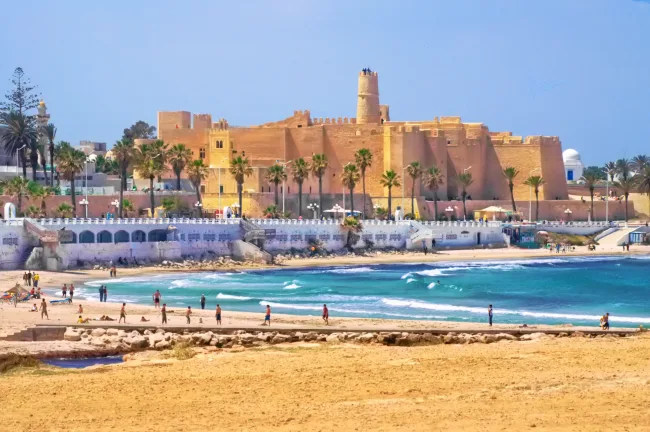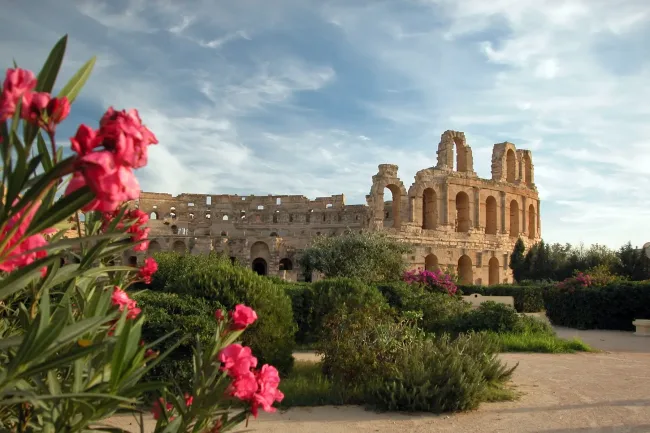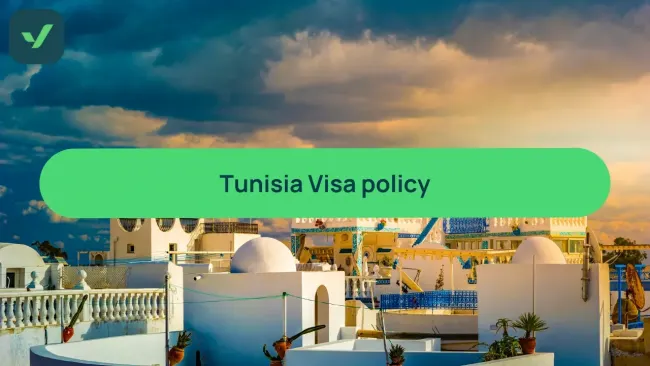
Tunisia
Welcome to Tunisia

Tunisia is an underrated gem in North Africa that offers a unique blend of ancient history, Mediterranean charm, and breathtaking Sahara desert landscapes. From the ancient ruins of Carthage to the stunning coastal holiday resorts of Hammamet, this country offers something for everyone.
Planning a trip to a new country can be overwhelming, so we are here to help. Read this ultimate Tunisia travel guide to plan your trip and know which travel documents you need.
Document checklist for Tunisia
-
Valid passport with a minimum validity of six months beyond the intended length of stay.
-
Visa (if applicable).
-
Proof of accommodation during your stay in Tunisia.
-
Sufficient funds to cover your trip.
-
Return airline ticket or onward travel ticket.
Essential Tunisia travel information
-
Currency - The official currency is the Tunisian Dinar (TND). 1 USD is equivalent to approximately 2.79 TND.
-
Daily budget for one person - Expect to spend around USD 60 for food, transportation, and accommodation daily.
-
Languages - The official language is Arabic, spoken in almost the entire country. However, French is also widely spoken, especially in the tourist areas.
-
Number of travelers per year - In 2019, Tunisia received over 9 million tourists.
-
Socket type - Tunisia uses European-style Type C and Type E sockets with a voltage of 230V.
-
Time zone - Central European Time (CET) (UTC+1).
-
Top 3 cities to visit - Tunis, Sousse, and Hammamet.
-
Top 3 landmarks/monuments - The ancient city of Carthage, the Bardo Museum, and the Medina of Tunis.
Visa information for Tunisia
You may need a visa to enter the country. Here's an overview of the visa requirements:
Travelers from the United States or the EU can visit Tunisia for up to 90 days without a visa. If you plan to stay longer than 90 days, you must apply for a visa at the Tunisian embassy or consulate in your home country.
Use our handy Visa Checker Tool to find out more about travel documents for Tunisia!
Visa difficulty index for Tunisia
Accessibility: 3/5
Getting a visa for Tunisia is relatively easy and accessible. U.S. citizens and EU citizens are eligible for a visa on arrival. However, it's important to note that this option may only be available for some nationalities, and some travelers may still need to apply for a visa in advance at the embassy or consulate.
Time to get your visa: 3/5
The processing time for a Tunisian visa can vary depending on the type of visa and your nationality. Generally, it can take anywhere from a few days to a few weeks to receive a visa. While some travelers have reported receiving their visas quickly, it's essential to allow enough time for processing, especially during peak travel seasons.
Costs: 3/5
The cost of a Tunisian visa depends on the type of visa and your nationality.
Typical costs and budget for Tunisia
Tunisia is an affordable travel destination with various budget options. Here's an essential guide to what you can expect to spend daily when traveling through the major cities on an average budget.
Daily spending per person - Expect to spend around USD 60 per day, including meals, transport, and hotel.
-
Meals - Expect to spend around USD 7-10 per meal at a mid-range restaurant. Street food and local markets offer cheaper options, starting at USD 1 for a sandwich or pastry.
-
Transport - Taxis are widely available and relatively inexpensive, with fares starting at USD 2- 3 for short distances. Public transportation, such as buses and trains, is cheaper, with fares starting at USD 0.20- 0.40 per ride.
-
Hotel - Budget hotels can be found for as low as USD 10-14 per night, while mid-range hotels range from USD 21- 28 per night. Luxury accommodations can cost upwards of USD 70 per night.
A trip for two people for one week, including mid-range accommodations, transportation, and meals, can cost, on average, around USD 700- 875. However, costs may vary depending on the season, activities, and personal preferences.
Transport and ways to travel around Tunisia
Tunisia offers various modes of transportation and ways to travel to and around the North African country.
Flying to Tunisia
Tunisia's main international airport is Tunis-Carthage International Airport, located just outside the capital city. Several major airlines offer direct flights to Tunisia from major destinations worldwide, including Air France, Lufthansa, Turkish Airlines, and Tunisair.
Other airports in Tunisia that offer international flights include Djerba-Zarzis International Airport and Monastir Habib Bourguiba International Airport, popular destinations for tourists visiting Tunisia's coastal regions.
Arrival and immigration tips for Tunisia
Tunisia is becoming popular with tourists as more people realize the wonderful experiences the country has to offer. Here are some tips to get through the immigration process smoothly.
-
If you need a visa to enter Tunisia, it's recommended to apply in advance to avoid any delays or issues upon arrival.
-
Upon arrival, follow the signs for immigration and have your documents ready, including your passport, visa (if applicable), and any supporting documents such as a return ticket or proof of accommodation.
-
If you're eligible for a visa on arrival, expect long queues. It's recommended to apply for a visa in advance if you’re eligible to do so.
-
Depending on the time of day, there may be long queues or traffic at the airport, so plan accordingly and allow extra time for transportation and customs.
-
To get to and from the airport, you can take a taxi, a bus, or a private transfer. Taxis are widely available, but be sure to negotiate the fare in advance to avoid any surprises.
Best ways to travel around Tunisia
Tunisia offers various means of transportation for travelers to explore the country. The most common form of transport is shared taxis, known as ‘Louages’. These shared cars travel between cities and towns and can be flagged down on the street or found at designated stations. They are generally cheap and reliable, but it's essential to negotiate the price before getting in.
Another popular mode of transportation is the train, which is a more comfortable option for longer journeys. The national railway company, SNCFT, operates a train network connecting major cities and towns across the country. Travelers can purchase tickets at the train station or online in advance.
Buses are also available for travel within cities and villages and for longer distances between destinations. They can be found at bus stations and booked in advance or on the day of travel. It's recommended to check the schedules beforehand, as they may vary depending on the season.
Taxis and local buses are available for getting around within cities and towns. Taxis can be found along streets and negotiated for a fare before getting in. Be aware that Tunisian traffic can be chaotic, so always wear your seatbelt!
Most tourist resorts offer free transfers or shuttles to and from the airport and major nearby tourist sites.
Safety in Tunisia
Like many other countries, Tunisia is generally a safe country for travelers, with a low crime rate and a welcoming local population. However, visitors should still exercise caution and take certain safety precautions to ensure a smooth and enjoyable trip.
-
While terrorist incidents have occurred in the past, the Tunisian government has taken significant steps to improve security measures and reduce the risk of further attacks.
-
Visitors should always follow government advice and avoid areas near the borders with Libya and Algeria, and any areas deemed sensitive or off-limits by local authorities.
-
Additionally, travelers should take basic safety measures such as keeping valuables secure, avoiding displays of wealth, and being cautious when using ATMs or exchanging money.
-
It is also advisable to keep a close eye on your belongings when in crowded areas and to be wary of pickpockets and scams targeting tourists.
-
It is an Islamic country, and visitors should respect local traditions and culture, especially when visiting religious sites...
-
It is recommended to have travel insurance for the duration of your trip.
With some sensible precautions, travelers to Tunisia can enjoy a safe and memorable trip.
Weather in Tunisia
Tunisia has a Mediterranean climate, with hot, dry summers and mild, rainy winters. The best time to visit is during the spring (March to May) and autumn (September to November), when temperatures are mild, and there's less rainfall.
During these seasons, the average temperature ranges from 20-25°C (68-77°F) during the day and 10-15°C (50-59°F) at night.
Must do and see in Tunisia
-
Visit the ancient city of Carthage: This UNESCO World Heritage Site near Tunis is a must-see for history enthusiasts. The city was once a powerful Phoenician trading empire and later a Roman city, and you can explore the ruins of temples, amphitheaters, and the famous Carthaginian port.
-
Explore the medina of Tunis: This labyrinth of narrow streets, souks, and traditional houses is a must when visiting Tunisia. It's the perfect place to immerse yourself in Tunisian culture, shop for local crafts and souvenirs, and sample delicious street food.
-
Relax on the beaches of Hammamet: This famous town is the jewel of Tunisia tourism, located along the white-sand beaches and turquoise waters of the Mediterranean Sea. It's a great place to soak up the sun.
-
Take a desert safari in Douz: Also known as the ‘Gateway to the Sahara’ Douz offers loads of local activities such as camel riding or 4×4 safaris to see stunning landscapes, including dunes, oases, and ancient Berber villages.
-
Experience the holy city of Kairouan: Kairouan is an essential Islamic center and home to many historic mosques and religious buildings, including the Great Mosque of Kairouan. It's a great place to learn about Tunisian culture and religion and to sample traditional sweets like Makroudh.
Typical Tunisian food to try
Tunisia has many delicious dishes influenced by Arab and Nomad cultures. Here are five traditional Tunisian dishes to try on your trip:
-
Couscous - A staple dish of steamed semolina grains served with various meats or vegetables, often accompanied by spicy harissa sauce. This is considered the national dish of Tunisia.
-
Brik - This fried pastry is filled with egg, mashed potatoes, tuna, and harissa. It's a popular street food snack for breakfast or as an appetizer. Brik is crispy on the outside and savory on the inside, with a spicy kick from the harissa..
-
Lablabi - A famed northern Tunisia chickpea soup made with garlic, cumin, and bread, often topped with a boiled egg and drizzled with olive oil.
-
Mechouia This refreshing salad is made with grilled peppers, tomatoes, onion, tuna, olives, and capers, and dressed with olive oil and lemon juice.
-
Ojja - A spicy tomato-based stew with eggs, sausage, and harissa, often served with crusty bread for dipping.
Vaccine information for Tunisia
The CDC recommends certain vaccinations for travelers to Tunisia, including the measles-mumps-rubella (MMR) vaccine.
A yellow fever vaccine certificate is required for travelers coming from certain countries in Africa and South America. It is also recommended that travelers be up-to-date on their flu vaccine and COVID-19 vaccines.

Explore the ancient city of Dougga
Tunisia is home to the ancient city of Dougga, considered one of the best-preserved Roman ruins and cities in North Africa. The city dates back to the 2nd century BC and boasts well-preserved ruins, including a theater, a forum, temples, and public baths.
In 1997, Dougga was declared a UNESCO World Heritage Site, making it a must-see destination for history and architecture enthusiasts. Additionally, the city is surrounded by stunning natural landscapes, including rolling hills and olive groves, making it a unique and picturesque destination for travelers.
Dougga is located in Téboursouk, in the north of Tunisia. It is about a two-hour drive from Tunis. The best way to get there is by renting a car or sharing a taxi with other travelers.

 Australia ETA Online
Australia ETA Online
 United Kingdom ETA
United Kingdom ETA
 India Tourist eVisa
India Tourist eVisa
 Canada ETA Visa
Canada ETA Visa
 Turkey eVisa
Turkey eVisa
 Egypt eVisa
Egypt eVisa
 Singapore SG Arrival Card
Singapore SG Arrival Card
 Indonesia eVoa Visa
Indonesia eVoa Visa
 Aruba ED Card
Aruba ED Card

